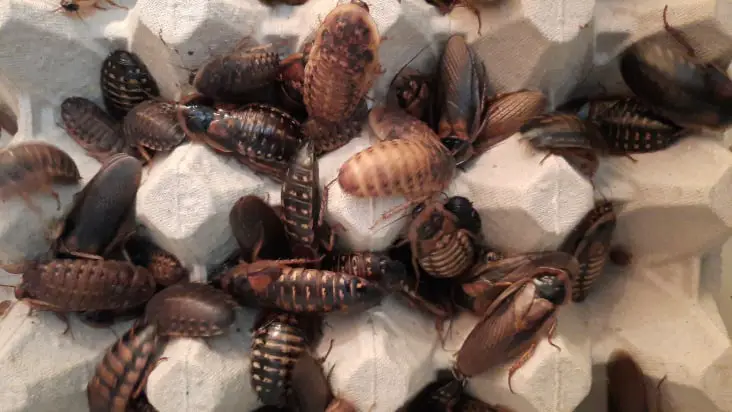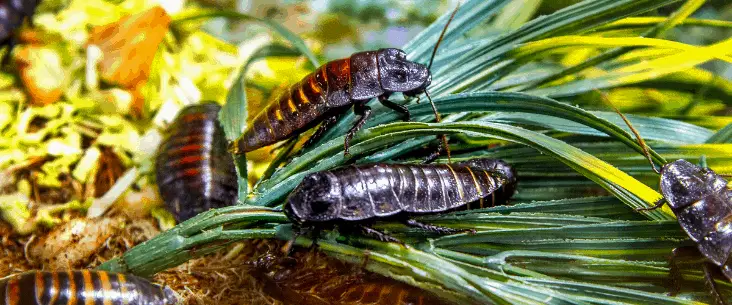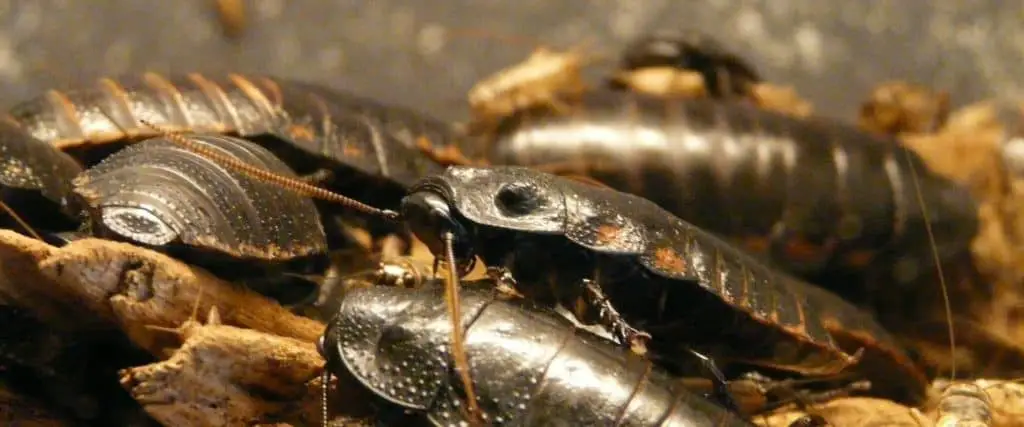What to feed dubia roaches. It sounds like an easy question, right? Well, if you found this article, you probably still have some questions left about what and how to feed dubia roaches. Keeping dubia roaches alive is one thing; how to keep them healthy or make them a healthy and nutritional feeder insect is something totally different. In this guide, we take a practical deep dive into what food is best for your roaches and what the best practices there are to feed you dubias. So, without any further delay, let’s dive in.
Dubia roaches can be fed a mixture of fresh fruits, vegetables, flours & oats, and pre-formulated diets to keep them healthy and high reproductive. Although dubias are scavengers with simple needs, it is best to gut-load them with specific needs to make them nutritional high-quality feeders for other animals.
Although this summary takes the highlights of feeding dubia roaches, there is much more to learn to keep the healthiest (feeder) roaches. Find out more in the different sections below, where we discuss the healthy and favourite food of dubias, what food items you should avoid, how to feed your roaches and how you best can gut-load them (but is it necessary in the first place).
What Should I Feed Dubia Roaches?
Dubia roaches are very opportunistic scavengers. Scavengers with simple, basic needs. They will almost eat anything that they can get their mouth on. But that does not mean you should feed them everything. Because dubia roaches serve as feeder insects, their nutritional composition and value depend on what you feed them. What you feed your dubias directly affects the quality of nutrition your animals get.
Although they eat almost anything, the main food source for them is vegetables and fruits. Wild dubia roaches are mainly herbivorous, meaning they eat mainly plant materials and fruits. So it is good practice that the diet exists for a large part of fruits and vegetables.
Other food sources you can offer are pelleted food for dogs and cats, oats, cereal grains, chicking feed, and additives such as calcium powder or specialized dubia food.
Foods that are nutritional for your dubias and used to gutload them:
- Apples
- Bananas
- Berries
- Oranges
- Pears
- Carrots
- Cucumber
- Collared greens
- Spinach
- Kale
- Sweet potatoes
- Beets
- Brocolli
- Squash
- Bee pollen
- Alfalfa (meal)
- Complete Dubia Diet or check this dubia food.
Please don’t feed them only 1 product. Use some variation to make a complete diet with all the necessary nutrients—experiment with what your dubia roaches like best. Proper and fresh food keeps your dubia roaches healthy, makes them live longer, and ultimately makes them very nutritional feeders.
Healthy and well-nourished dubia roaches will also reproduce more and produce healthier offspring. Critical when you have your own dubia roaches breeding colony.
What Do Dubia Roaches Really Love Eating?
Although dubias eat almost anything, many dubias have a preference for oranges and carrots. I don’t know what it is, but when I feed them one of these, it is always eaten more from it than other products. So I recommend you to feed them at least to times a week carrots and oranges.
They don’t only like those; they are a great food to get your dubia roaches healthy. They contain important nutrients that make them healthy feeders.
Also, sweet potatoes and apples are often liked a lot by roaches. But as said before, try and experiment with other products as well. But don’t feed them everything. Some products must be avoided because they are not healthy for your dubia roaches long-term or don’t make them nutritional feeder insects.
What Should I Avoid Feeding Dubia Roaches?
Some products or type of products must be avoided or only be limited fed. In this section, we discuss different food sources that are best to be avoided.
First, you should avoid foods that contain high amounts of proteins. Dubias already are high protein insects, and they can even convert plant cellulose into protein. But even more important is how they deal with a high level of proteins in their diet.
Dubias have evolved to deal with scarcity by storing proteins as uric acid when protein is plentiful. This survival mechanism makes it possible for them to survive when food is limited or not available. Although this makes them survive almost under any circumstances and with any food regime, high uric acid levels are toxic for the animals that eat dubias.
And protein overload is also not healthy for the animals you wish to feed dubias, especially when they have already existing health issues or stress.
Be careful with cereal grains, chicking feed and a large amount of oat. These products contain a high amount of proteins. Also, many commercial dubia diets contain a large amount of protein which are completely unnecessary. Better to feed them a wide variety of greens, vegetables and fruits.
Also, avoid citrus, beans and meat to use as food for feeder dubias. And don’t feed them only on commercial dubia feeder. Always use commercial products alongside fresh fruits and vegetables — these products also contain water used to hydrate your dubia roaches.

How Often Should I Feed Dubia Roaches?
A question that is often asked to me is how frequent should you feed your dubia roaches. Although they can survive many days without food, it would be best to feed them at least every (other) day. At least feed them every two to three days to keep them healthy.
Even when food is still available in the enclosure, replacing it with new fresh food is better. Not only will the food lose its nutritional value, but it can also start rotting, or mould can start growing. Especially the latter can be a threat to your dubia populations health. Do you have a lot of food leftovers? Try to feed something else. Maybe they don’t like it. Have leftovers every day? Maybe you feed too much. Reduce the amount of food you provide, so you don’t have to throw it all away.
If you want to most nutritious roaches or want to have a high breeding output, you should ideal feed them every day new fresh fruits and vegetables. Especially when you have roaches that need to reproduce or offspring that need to grow, need good and high-value food.
How Best To Feed Dubia Roaches?
Depending on your setup, you can place food on the bottom of the enclosure or bin. Many roach keepers keep their dubias in an enclosure with egg flats. Place food close to the egg flats (and therefore close to the dubias), but don’t place moist food on or between the egg flats. When the egg flats get moist, mould will start growing rapidly.
When placing food below or between the egg flats, food gets quickly covered with dubia frass (poop! Beh). At the same time, you can’t see how well the roaches eat from the food or if the food needs to be removed and replaced.
When you feed powder food or a commercial feeder mix, place the food in a bowl with a shallow edge. This way, your roaches can easily access the food, especially the smaller ones.
Do Dubia Roaches Need Water? Hydrating Dubias!
Although dubia roaches can live a long time without food, they can quickly become dehydrated. Good hydration results in healthy dubia roaches.
However, do not place a water bowl in the enclosure. Smaller dubia roaches can drown in water. Instead, provide enough food that contains moisture to keep your roaches hydrated. If you provide fresh food every day, you don’t have to worry that your roaches get dehydrated.
Many stores and webshops advertise with water crystals to hydrate your feeder insects. Although they are safe and surely provide moisture to your dubias, I personally do not prefer them. They can be quite expensive and need more maintenance; otherwise, they will get dirty. And because you want to feed them fresh foods anyway, it is unnecessary to use the more expensive water crystals.
Some people suggest placing a sponge in a water bowl to hydrate feeder dubia roaches without the risk of smaller ones drown in the water. Although this works for many exotic pet animals, it is not recommended for dubia roaches. Again, they get enough moisture from the fresh food. Secondly, because dubias eat almost anything, they can start eating the sponge. And lastly, sponges are a breeding ground for bacteria in a heated enclosure. So don’t use sponges. Feed them fresh fruits instead.
How To Gut Load Dubia Roaches As Nutritional Feeder Insects?
Gut loading your dubia roaches makes them healthy feeder insects for the end consumer. Gut loading actually means provide high-value food so that the compound effect makes it a good feeder insect. So it is good practice to feed dubia roaches food that you otherwise also would provide to your pet animal.
Providing fresh and healthy food sources with lower protein content is a good way to gut load your dubias. Don’t use very high protein-based food sources, as we discussed earlier.
It takes 2 to 3 days for dubia roaches to digest their food. When you buy new dubia roaches, it takes at least 24 hours before the food you have provided affects the nutritional value of your feeder dubia. When you receive your dubia roaches, keep them apart with fresh food before feeding them to your pet. Ideally, dubia roaches should be gut loaded for 2 to 3 days before feeding them.
Breeders often feed other stuff that is focused on having a high breeding output and rapid growth of the offspring. This type of food is different from the food you use to gut load your dubia roaches. When you buy your roaches at the pet store, remember that they can be stored there for some time already without new food. So it is important to first feed them fresh and healthy food before using them as a feeder.
If you like to breed your own dubia roaches, you probably keep them on a much higher protein-based diet to stimulate reproduction. It is best to store the animals that you want to use from your breeding colony in a separate enclosure and feed them on a low-protein (plant-based) diet before using them as a feeder. This way, they can purge excess protein in their bodies so it isn’t a protein bomb for your pet animal, which can cause health issues for your end consumer.
Other bugs you can keep as a pet
Although cockroaches are amazing pets, there are many other bugs that make great pets too. Check out the bugs below, maybe you find them even more interesting to keep.
– Praying mantises
– Millipedes
– Beetles
– Ant colony
– Tarantulas
Share this page!


